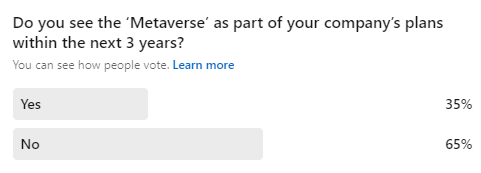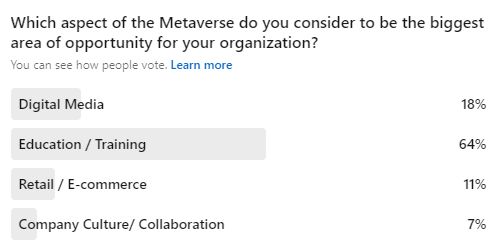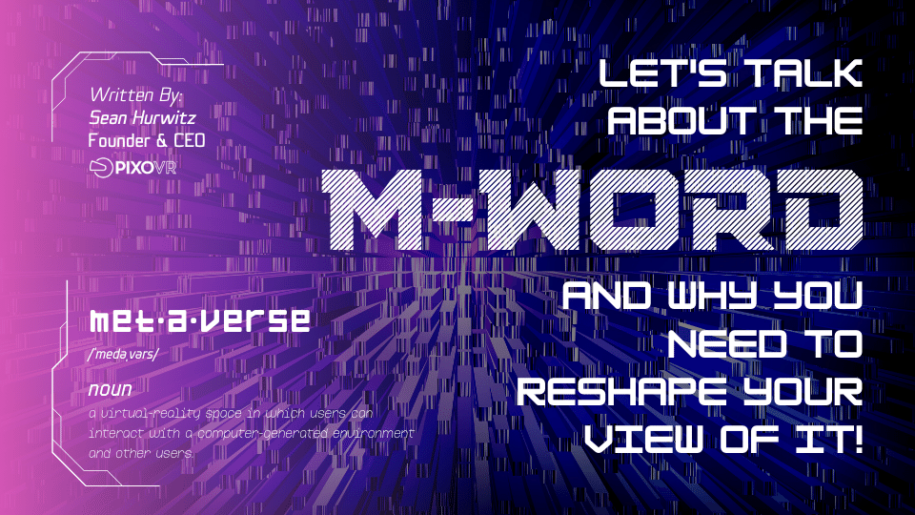Written by: Sean Hurwitz, Founder & CEO PIXO VR
Metaverse, or as I like to call it, ‘the M-word’ is all the rage right now in the extended reality (XR) space, and immersive tech in general. But what really is the Metaverse, and why do I think you need to reshape your view of it? Let’s dive in.
I’m certain all of you have at the very least have heard of the Metaverse at some point. Defined as ‘a single, universal, and immersive virtual world that is facilitated by the use of virtual reality and augmented reality headsets’, the M-word has turned into the biggest buzzword in immersive tech recently.
But that’s a good thing, right? Yes, and no! The term has certainly been overused by the big names in tech. Depending on if you’re a consumer or an enterprise, actual applications for this digital space is where the confusion comes in. At the moment, some of the world’s largest companies are throwing around this buzzword, but it’s nothing more than a vague glimpse into the future.
As I mentioned a few months back, it feels like we really are just calling everything the Metaverse now. At a recent VRARA conference, the so-called experts suggested from stage, “yes, the Metaverse is a thing and you should think about it, but we have no idea what it is or when you’ll have to focus on it. Also, it’s between 2-10 years away”. Honestly, useless information, if you can call it information. Attendees paying thousands of dollars to hear that!? It’s out of control.
Don’t get me wrong, the continued conversation around the M-word is exciting, and the future of the XR space is incredibly bright, but… in my opinion, these massive organizations are distracting from the XR adoption we have seen for enterprise customers. First off, none of these giants leading the charge on the so-called ‘Metaverse’ have an actual product that Fortune 500 companies can use today to generate ROI, and the so-called experts haven’t really done anything like launch a product that companies are consuming / paying for.
Early adopters want relevant, easily adopted content along with an affordable headset to begin to prove value. These early movers in the enterprise XR space want (and need) a path to prove out ROI. The Metaverse discussion being thrown around today by the big names is like pitching Netflix while we’re still renting movies from Redbox at the grocery store; a broad idea for the future, but not a solution that can be applied TODAY.
So what now? The Metaverse is here, and it’s a technology that many companies will want to leverage, if they can first identify how to leverage it and then actually do so. If not, this will stall the XR industry and take away from all of our hard work over the last several years. The key is to keep solving today’s problems for these brands in XR and morph the idea of a Metaverse around enterprise needs, rather than vice versa.
In a recent LinkedIn poll I published, 65% of respondents said they do not see the ‘Metaverse’ as part of their company’s plans for the next three years. It’s clear many organizations are viewing the Metaverse as an unattainable pipe dream solution of sorts. This needs to change. So how do we create solutions today and give companies the ‘Metaverse’ that they are being promised in the future?

Here’s how I see the Metaverse actually being applied for enterprise (and it’s already happening):
Companies: The Metaverse idea should be shaped around your company, rather than the reverse. Think: YOUniverse, not Metaverse.
On top of that, enterprise customers don’t (and shouldn’t) have to solve all their problems with the Metaverse now; they’ll get there. It’s all about finding an entrance into the XR space and expanding from there after proving out ROI.
When you really boil it down, the starting point for this is to simply give clients an environment that replicates theirs (with the appropriate use cases) and be able to manage and track data within said environment. One platform for everything, making it a seamless experience for the company and their users. With the growth in ‘digital twin’ technology (a digital representation of a real-world entity or system), along with an improvement in development timelines and costs, more and more companies are realizing the potential of leveraging XR, most notably in the area of training.
When pairing this (now more attainable) XR training content with a platform that makes things easier from a distribution and management standpoint, companies can prove out ROI and develop this virtual space from there. They have the early stages of their very own ‘Metaverse’ that can lead to planning, designing, collaborating, operations, among other valuable use cases. A potentially massive competitive advantage that any large enterprise would be thrilled to be ahead of the curve on. The time is now for companies to dive into XR, and work to build their version of the Metaverse around their training.
In another LinkedIn poll, I asked: which aspect of the Metaverse do you consider to be the biggest area of opportunity for your organization? ‘Education/Training’ was the overwhelming favorite, receiving 64% of the votes, followed by ‘Digital Media’ at 18%, ‘Retail / E-commerce’ at 11%, and ‘Company Culture / Collaboration’ at 7%.

Across various industries, companies are replicating their environments in VR or AR, and realizing numerous benefits including reducing training costs, improving employee safety, overcoming the skilled labor gap, keeping employees more engaged, and even improving company culture! All the while, these organizations are also laying the groundwork for what can be their ‘Metaverse’! Their training program is just the launching off point for this virtual space for digital business to take place.
The last piece to all of this is obviously scaling. Hosting training in virtual reality is one thing, but more importantly is having an XR platform that allows for scaling globally, with additional use cases beyond just training. All of this talk of a YOUniverse is simply not possible without a platform that allows for it.
My challenge to every large enterprise out there: start now! Don’t wait for someone to bring you the perfect ‘Metaverse’ solution, forge that yourself. The Metaverse isn’t going to pop up out of nowhere and be perfectly tailored to your company’s needs. Find an avenue to get into the XR space, and create a foundation for the future, all the while having a positive impact on the bottom line with impactful XR training.
The M-word can be intimidating or outright confusing based on how it is being promoted lately, but enterprise clients can take advantage of this technology today by starting small and building a Metaverse that fits their needs.

Leave a Reply
You must be logged in to post a comment.